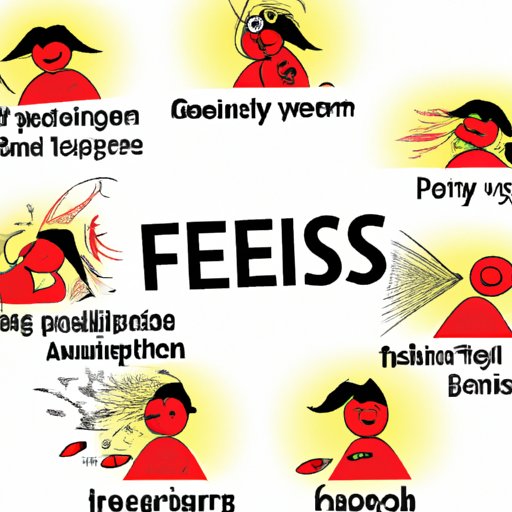Introduction
A sneezing fit is an episode of several consecutive sneezes. While it can be normal to sneeze once or twice in a row, a sneezing fit typically involves a rapid succession of several sneezes. It’s important to understand what may be causing your sneezing fits in order to reduce or avoid them. In this article, we’ll explore some of the most common medical, allergic, environmental, and even emotional causes of sneezing fits.

Exploring Medical Causes of Sneezing Fits
There are a number of medical causes of sneezing fits. These include colds, sinus infections, and other upper respiratory infections such as bronchitis. According to Dr. Robert Glatter, an emergency physician at Lenox Hill Hospital in New York City, “Infectious agents like viruses or bacteria can trigger acute inflammation of the nasal passages, leading to sneezing bouts.”
Medications can also lead to a sneezing fit. Dr. Glatter explains, “Certain medications, including antibiotics and ACE inhibitors, can cause an allergic reaction, which can trigger sneezing.” It’s important to talk to your doctor if you experience a sneezing fit after taking any medication.

Allergens as a Common Cause of Sneezing Fits
Allergens are one of the most common causes of sneezing fits. Allergens are substances that cause an allergic reaction in some people. Common allergens include pollen, dust mites, pet dander, mold, and cockroaches. According to Dr. Glatter, “Allergens can cause inflammation and irritation of the nasal passages, leading to sneezing fits.”
The best way to reduce or avoid sneezing fits due to allergens is to identify and avoid the allergens that trigger your sneezing fits. An allergist can help you identify your allergens through skin prick testing or blood tests.

Examining Environmental Causes of Sneezing Fits
Environmental factors can also cause sneezing fits. Air pollution, changes in temperature, and dust and other particles in the air can all lead to sneezing fits. According to a study published in the journal Clinical and Experimental Allergy, “Air pollutants, such as ozone, nitrogen dioxide, and particulate matter, have been associated with increased risk of allergic diseases, including allergic rhinitis.”
The best way to reduce or avoid sneezing fits due to environmental causes is to try to limit your exposure to these factors. For example, you can wear a face mask when outdoors to limit your exposure to air pollution. You can also keep your windows closed during times of high pollen or dust levels.
Investigating Possible Triggers of Sneezing Fits
Certain foods and beverages can also trigger sneezing fits. According to Dr. Glatter, “Spicy foods, alcohol, and caffeine can cause the nasal passages to become inflamed, leading to sneezing.” It’s important to pay attention to the foods and beverages you consume to determine if they are triggering your sneezing fits.
Emotions can also trigger sneezing fits. According to a study published in the journal Psychosomatic Medicine, ” Patients with a history of recurrent sneezing reported increased sneezing when feeling anxious and excited.” It’s important to note how you feel before a sneezing fit to see if emotions may be playing a role.
Understanding the Role of Genetics in Sneezing Fits
Genetics can also play a role in sneezing fits. If someone in your family has a history of sneezing fits, you may be at an increased risk. According to Dr. Glatter, “Having a family history of allergies or asthma can increase the likelihood of having a sneezing fit.”
If you have a family history of sneezing fits, you may want to consider genetic testing. Genetic testing can help you determine if you are at an increased risk for sneezing fits. However, it’s important to talk to your doctor before undergoing any type of genetic testing.
Conclusion
Sneezing fits can be caused by many different factors. Common medical causes include colds, sinus infections, and other upper respiratory infections, as well as certain medications. Allergens, air pollution, changes in temperature, dust and other particles, certain foods and beverages, and emotions can all lead to sneezing fits. Genetics can also play a role in sneezing fits.
The best way to reduce or avoid sneezing fits is to identify and avoid the triggers that cause them. If you have a family history of sneezing fits, you may want to consider genetic testing. It’s important to talk to your doctor if you experience a sneezing fit, especially if it is accompanied by other symptoms.
(Note: Is this article not meeting your expectations? Do you have knowledge or insights to share? Unlock new opportunities and expand your reach by joining our authors team. Click Registration to join us and share your expertise with our readers.)
